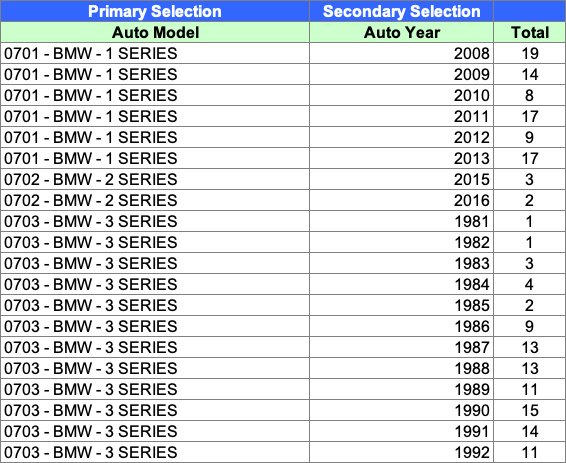I realized something recently while speaking to European and specialty auto shop owners about direct mail campaigns. They were unclear on the sources and capabilities of targeted lists for their auto shops. In this blog, I will provide some transparency about targeted mailing lists for auto repair shops.
The 6 Types of Auto Data Available on Consumers

- Make
- Model
- Year
- Fuel Type
- Auto Class
- Auto Style
The Impact of the Shelby Amendment
Before 2000, this auto data was available from the DMV. As of June 1, 2000, if any DMV sold or shared this data, they would not get federal highway funding. This was due to the Shelby Amendment (or Data Access Act) to the Driver’s Privacy Protection Act (DPPA) of 1994. This made it hard for marketers and list providers to get this data from driver’s licenses and vehicle registrations.1
Where Does Vehicle Owner Data Come From?
Where consumer auto data comes from seems to be the most confusing point for shop owners. Since the DMV does not release this data, the actual data that is available is compiled using multiple sources. The following are the primary sources of this information. This list includes but is not limited to:
- Co-Registration Data: Auto service shops record VIN numbers and car info, and sell this data to list compilers. Over 90% of lists come from service shops that report VIN information. But there is a lack of information on new models because the vehicle owners haven’t gone to a service provider that releases their data.
- Responder Info: This data comes from people who fill out surveys, forms in magazines, and other forms.
- Online Insurance Quotes
- Warranty Companies
- Transactional Data: This info comes from people who buy something for their car, like a stereo or running boards.
- Major Car Clubs of America
- Aftermarket Repair Companies
What to Ask Before Buying a Targeted Vehicle Mailing List
- Is your list triple verified? This means your list must have come from, and been verified by, three of the sources listed above in order for the record to be included.
- Is your list NCOA certified? To NCOA certify a list involves using USPS National Change of Address data to make sure the recipient’s name matches their current address. This confirms that vehicle owners haven’t moved and are in fact located at the address on your list.
- Is your list Shelby compliant? This means that the consumers agreed to release their personal information. And the list provider must have obtained their information in the context of the sale of a service or product no more than twelve months before sending any direct marketing communications.
I can tell you firsthand that not all list providers are equal. I vetted more than 10 of the top list vendors when choosing our resource for targeted lists. I recommend doing your research, asking all the questions above, and comparing list counts from more than one vendor.
Sources
